- Home
- Tobias Wolff
In the Garden of the North American Martyrs
In the Garden of the North American Martyrs Read online
In the Garden of the North American Martyrs
Tobias Wolff
FOR CATHERINE
Contents
Next Door
Hunters in the Snow
An Episode in the Life of Professor Brooke
Smokers
Face to Face
Passengers
Maiden Voyage
Worldly Goods
Wingfield
In the Garden of the North American Martyrs
Poaching
The Liar
About the Author
Praise
Other Books by Tobias Wolff
Copyright
About the Publisher
Next Door
I wake up afraid. My wife is sitting on the edge of my bed, shaking me. “They’re at it again,” she says.
I go to the window. All their lights are on, upstairs and down, as if they have money to burn. He yells, she screams something back, the dog barks. There is a short silence, then the baby cries, poor thing.
“Better not stand there,” says my wife. “They might see you.”
I say, “I’m going to call the police,” knowing she won’t let me.
“Don’t,” she says.
She’s afraid that they will poison our cat if we complain.
Next door the man is still yelling, but I can’t make out what he’s saying over the dog and the baby. The woman laughs, not really meaning it, “Ha! Ha! Ha!,” and suddenly gives a sharp little cry. Everything goes quiet.
“He struck her,” my wife says. “I felt it just the same as if he struck me.”
Next door the baby gives a long wail and the dog starts up again. The man walks out into his driveway and slams the door.
“Be careful,” my wife says. She gets back into her bed and pulls the covers up to her neck.
The man mumbles to himself and jerks at his fly. Finally he gets it open and walks over to our fence. It’s a white picket fence, ornamental more than anything else. It couldn’t keep anyone out. I put it in myself, and planted honeysuckle and bougainvillea all along it.
My wife says, “What’s he doing?”
“Shh,” I say.
He leans against the fence with one hand and with the other he goes to the bathroom on the flowers. He walks the length of the fence like that, not missing any of them. When he’s through he gives Florida a shake, then zips up and heads back across the driveway. He almost slips on the gravel but he catches himself and curses and goes into the house, slamming the door again.
When I turn around my wife is leaning forward, watching me. She raises her eyebrows. “Not again,” she says.
I nod.
“Number one or number two?”
“Number one.”
“Thank God for small favors,” she says, settling back. “Between him and the dog it’s a wonder you can get anything to grow out there.”
I read somewhere that human pee has a higher acid content than animal pee, but I don’t mention that. I would rather talk about something else. It depresses me, thinking about the flowers. They are past their prime, but still. Next door the woman is shouting. “Listen to that,” I say.
“I used to feel sorry for her,” my wife says. “Not any more. Not after last month.”
“Ditto,” I say, trying to remember what happened last month to make my wife not feel sorry for the woman next door. I don’t feel sorry for her either, but then I never have. She yells at the baby, and excuse me, but I’m not about to get all excited over someone who treats a child like that. She screams things like “I thought I told you to stay in your bedroom!” and here the baby can’t even speak English yet.
As far as her looks, I guess you would have to say she’s pretty. But it won’t last. She doesn’t have good bone structure. She has a soft look to her, like she has never eaten anything but donuts and milk shakes. Her skin is white. The baby takes after her, not that you would expect it to take after him, dark and hairy. Even with his shirt on you can tell that he has hair all over his back and on his shoulders, thick and springy like an Airedale’s.
Now they’re all going at once over there, plus they’ve got the hi-fi turned on full blast. One of those bands. “It’s the baby I feel sorry for,” I say.
My wife puts her hands over her ears. “I can’t stand another minute of it,” she says. She takes her hands away. “Maybe there’s something on TV.” She sits up. “See who’s on Johnny.”
I turn on the television. It used to be down in the den but I brought it up here a few years ago when my wife came down with an illness. I took care of her myself—made the meals and everything. I got to where I could change the sheets with her still in the bed. I always meant to take the television back down when my wife recovered from her illness, but I never got around to it. It sits between our beds on a little table I made. Johnny is saying something to Sammy Davis, Jr. Ed McMahon is bent over laughing. He is always so cheerful. If you were going to take a really long voyage you could do worse than bring Ed McMahon along.
“Sammy,” says my wife. “Who else is on besides Sammy?”
I look at the TV guide. “A bunch of people I never heard of.” I read off their names. My wife hasn’t heard of them either. She wants to know what else is on. “‘El Dorado,’” I read. “‘Brisk adventure yarn about a group of citizens in search of the legendary city of gold.’ It’s got two-and-a-half stars beside it.”
“Citizens of what?” my wife asks.
“It doesn’t say.”
Finally we watch the movie. A blind man comes into a small town. He says that he has been to El Dorado, and that he will lead an expedition there for a share of the proceeds. He can’t see, but he will call out the landmarks one by one as they ride. At first people make fun of him, but eventually all the leading citizens get together and decide to give it a try. Right away they get attacked by Apaches and some of them want to turn back, but every time they get ready the blind man gives them another landmark, so they keep riding.
Next door the woman is going crazy. She is saying things to him that no person should ever say to another person. It makes my wife restless. She looks at me. “Can I come over?” she says. “Just for a visit?”
I pull down the blankets and she gets in. The bed is just fine for one, but with two of us it’s a tight fit. We are lying on our sides with me in back. I don’t mean for it to happen but before long old Florida begins to stiffen up on me. I put my arms around my wife. I move my hands up onto the Rockies, then on down across the Plains, heading South.
“Hey,” she says. “No Geography. Not tonight.”
“I’m sorry,” I say.
“Can’t I just visit?”
“Forget it. I said I was sorry.”
The citizens are crossing a desert. They have just about run out of water, and their lips are cracked. Though the blind man has delivered a warning, someone drinks from a poisoned well and dies horribly. That night, around the campfire, the others begin to quarrel. Most of them want to go home. “This is no country for a white man,” one says, “and if you ask me nobody has ever been here before.” But the blind man describes a piece of gold so big and pure that it will burn your eyes out if you look directly at it. “I ought to know,” he says. When he is finished the citizens are silent: one by one they move away and lie down on their bedrolls. They put their hands behind their heads and look up at the stars. A coyote howls.
Hearing the coyote, I remember why my wife doesn’t feel sorry for the woman next door. It was a Monday evening, about a month ago, right after I got home from work. The man next door started to beat the dog, and I don’t mean just smacking him once or twice. He was bea
ting him, and he kept beating him until the dog couldn’t even cry any more; you could hear the poor creature’s voice breaking. It made us very upset, especially my wife, who is an animal lover from way back. Finally it stopped. Then, a few minutes later, I heard my wife say, “Oh!” and I went into the kitchen to find out what was wrong. She was standing by the window, which looks into the kitchen next door. The man had his wife backed up against the fridge. He had his knee between her legs and she had her knee between his legs and they were kissing, really hard, not just with their lips but rolling their faces back and forth one against the other. My wife could hardly speak for a couple of hours afterwards. Later she said that she would never waste her sympathy on that woman again.
It’s quiet over there. My wife has gone to sleep and so has my arm, which is under her head. I slide it out and open and close my fingers, considering whether to wake her up. I like sleeping in my own bed, and there isn’t enough room for the both of us. Finally I decide that it won’t hurt anything to change places for one night.
I get up and fuss with the plants for a while, watering them and moving some to the window and some back. I trim the coleus, which is starting to get leggy, and put the cuttings in a glass of water on the sill. All the lights are off next door except the one in their bedroom window. I think about the life they have, and how it goes on and on, until it seems like the life they were meant to live. Everybody is always saying how great it is that human beings are so adaptable, but I don’t know. A friend of mine was in the Navy and he told me that in Amsterdam, Holland, they have a whole section of town where you can walk through and from the street you can see women sitting in rooms, waiting. If you want one of them you just go in and pay, and they close the drapes. This is nothing special to the people who live in Holland. In Istanbul, Turkey, my friend saw a man walking down the street with a grand piano on his back. Everyone just moved around him and kept going. It’s awful, what we get used to.
I turn off the television and get into my wife’s bed. A sweet, heavy smell rises off the sheets. At first it makes me dizzy but after that I like it. It reminds me of gardenias.
The reason I don’t watch the rest of the movie is that I can already see how it will end. The citizens will kill each other off, probably about ten feet from the legendary city of gold, and the blind man will stumble in by himself, not knowing that he has made it back to El Dorado.
I could write a better movie than that. My movie would be about a group of explorers, men and women, who leave behind their homes and their jobs and their families—everything they have known. They cross the sea and are shipwrecked on the coast of a country which is not on their maps. One of them drowns. Another gets attacked by a wild animal, and eaten. But the others want to push on. They ford rivers and cross an enormous glacier by dog sled. It takes months. On the glacier they run out of food, and for a while there it looks like they might turn on each other, but they don’t. Finally they solve their problem by eating the dogs. That’s the sad part of the movie.
At the end we see the explorers sleeping in a meadow filled with white flowers. The blossoms are wet with dew and stick to their bodies, petals of columbine, clematis, blazing star, baby’s breath, larkspur, iris, rue—covering them completely, turning them white so that you cannot tell one from another, man from woman, woman from man. The sun comes up. They stand and raise their arms, like white trees in a land where no one has ever been.
Hunters in the Snow
Tub had been waiting for an hour in the falling snow. He paced the sidewalk to keep warm and stuck his head out over the curb whenever he saw lights approaching. One driver stopped for him but before Tub could wave the man on he saw the rifle on Tub’s back and hit the gas. The tires spun on the ice.
The fall of snow thickened. Tub stood below the overhang of a building. Across the road the clouds whitened just above the rooftops, and the street lights went out. He shifted the rifle strap to his other shoulder. The whiteness seeped up the sky.
A truck slid around the corner, horn blaring, rear end sashaying. Tub moved to the sidewalk and held up his hand. The truck jumped the curb and kept coming, half on the street and half on the sidewalk. It wasn’t slowing down at all. Tub stood for a moment, still holding up his hand, then jumped back. His rifle slipped off his shoulder and clattered on the ice, a sandwich fell out of his pocket. He ran for the steps of the building. Another sandwich and a package of cookies tumbled onto the new snow. He made the steps and looked back.
The truck had stopped several feet beyond where Tub had been standing. He picked up his sandwiches and his cookies and slung the rifle and went up to the driver’s window. The driver was bent against the steering wheel, slapping his knees and drumming his feet on the floorboards. He looked like a cartoon of a person laughing, except that his eyes watched the man on the seat beside him. “You ought to see yourself,” the driver said. “He looks just like a beach ball with a hat on, doesn’t he? Doesn’t he, Frank?”
The man beside him smiled and looked off.
“You almost ran me down,” Tub said. “You could’ve killed me.”
“Come on, Tub,” said the man beside the driver. “Be mellow. Kenny was just messing around.” He opened the door and slid over to the middle of the seat.
Tub took the bolt out of his rifle and climbed in beside him. “I waited an hour,” he said. “If you meant ten o’clock why didn’t you say ten o’clock?”
“Tub, you haven’t done anything but complain since we got here,” said the man in the middle. “If you want to piss and moan all day you might as well go home and bitch at your kids. Take your pick.” When Tub didn’t say anything he turned to the driver. “Okay, Kenny, let’s hit the road.”
Some juvenile delinquents had heaved a brick through the windshield on the driver’s side, so the cold and snow tunneled right into the cab. The heater didn’t work. They covered themselves with a couple of blankets Kenny had brought along and pulled down the muffs on their caps. Tub tried to keep his hands warm by rubbing them under the blanket but Frank made him stop.
They left Spokane and drove deep into the country, running along black lines of fences. The snow let up, but still there was no edge to the land where it met the sky. Nothing moved in the chalky fields. The cold bleached their faces and made the stubble stand out on their cheeks and along their upper lips. They stopped twice for coffee before they got to the woods where Kenny wanted to hunt.
Tub was for trying someplace different; two years in a row they’d been up and down this land and hadn’t seen a thing. Frank didn’t care one way or the other, he just wanted to get out of the goddamned truck. “Feel that,” Frank said, slamming the door. He spread his feet and closed his eyes and leaned his head way back and breathed deeply. “Tune in on that energy.”
“Another thing,” Kenny said. “This is open land. Most of the land around here is posted.”
“I’m cold,” Tub said.
Frank breathed out. “Stop bitching, Tub. Get centered.”
“I wasn’t bitching.”
“Centered,” Kenny said. “Next thing you’ll be wearing a nightgown, Frank. Selling flowers out at the airport.”
“Kenny,” Frank said, “you talk too much.”
“Okay,” Kenny said. “I won’t say a word. Like I won’t say anything about a certain babysitter.”
“What babysitter?” Tub asked.
“That’s between us,” Frank said, looking at Kenny. “That’s confidential. You keep your mouth shut.”
Kenny laughed.
“You’re asking for it,” Frank said.
“Asking for what?”
“You’ll see.”
“Hey,” Tub said, “are we hunting or what?”
They started off across the field. Tub had trouble getting through the fences. Frank and Kenny could have helped him; they could have lifted up on the top wire and stepped on the bottom wire, but they didn’t. They stood and watched him. There were a lot of fences and Tub was puffing when
they reached the woods.
They hunted for over two hours and saw no deer, no tracks, no sign. Finally they stopped by the creek to eat. Kenny had several slices of pizza and a couple of candy bars: Frank had a sandwich, an apple, two carrots, and a square of chocolate; Tub ate one hard-boiled egg and a stick of celery.
“You ask me how I want to die today,” Kenny said, “I’ll tell you burn me at the stake.” He turned to Tub. “You still on that diet?” He winked at Frank.
“What do you think? You think I like hard-boiled eggs?”
“All I can say is, it’s the first diet I ever heard of where you gained weight from it.”
“Who said I gained weight?”
“Oh, pardon me. I take it back. You’re just wasting away before my very eyes. Isn’t he, Frank?”
Frank had his fingers fanned out, tips against the bark of the stump where he’d laid his food. His knuckles were hairy. He wore a heavy wedding band and on his right pinky another gold ring with a flat face and an “F” in what looked like diamonds. He turned the ring this way and that. “Tub,” he said, “you haven’t seen your own balls in ten years.”
Kenny doubled over laughing. He took off his hat and slapped his leg with it.
“What am I supposed to do?” Tub said. “It’s my glands.”
They left the woods and hunted along the creek. Frank and Kenny worked one bank and Tub worked the other, moving upstream. The snow was light but the drifts were deep and hard to move through. Wherever Tub looked the surface was smooth, undisturbed, and after a time he lost interest. He stopped looking for tracks and just tried to keep up with Frank and Kenny on the other side. A moment came when he realized he hadn’t seen them in a long time. The breeze was moving from him to them; when it stilled he could sometimes hear Kenny laughing but that was all. He quickened his pace, breasting hard into the drifts, fighting away the snow with his knees and elbows. He heard his heart and felt the flush on his face but he never once stopped.

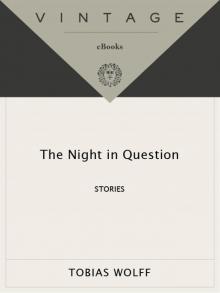 The Night in Question: Stories
The Night in Question: Stories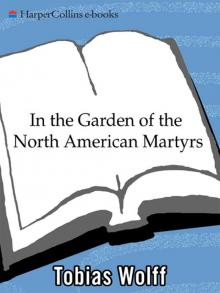 In the Garden of the North American Martyrs
In the Garden of the North American Martyrs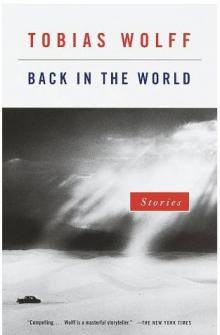 Back in the World: Stories
Back in the World: Stories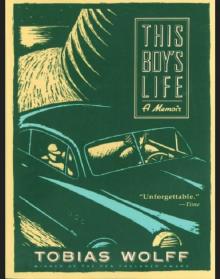 This Boy's Life
This Boy's Life Old School
Old School In Pharaoh's Army: Memories of the Lost War
In Pharaoh's Army: Memories of the Lost War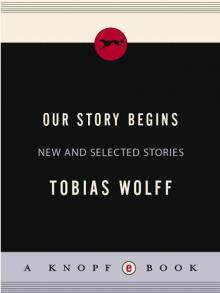 Our Story Begins: New and Selected Stories
Our Story Begins: New and Selected Stories The Barracks Thief
The Barracks Thief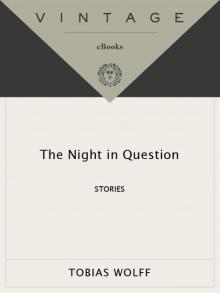 The Night In Question
The Night In Question In Pharaoh's Army
In Pharaoh's Army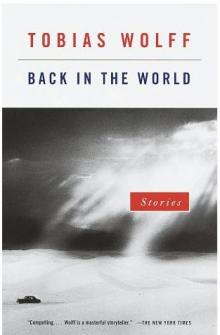 Back in the World
Back in the World